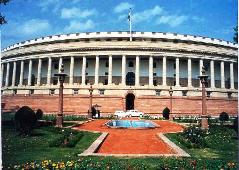 | « Back to article | Print this article |
 Rise in global commodity as well as crude prices, mounting subsidy burden, and the fear of a shortfall in disinvestment proceeds have made economists and experts unsure about the state of government's finances.
Rise in global commodity as well as crude prices, mounting subsidy burden, and the fear of a shortfall in disinvestment proceeds have made economists and experts unsure about the state of government's finances.
However, the finance ministry is hopeful of keeping its fiscal deficit under control.
The optimism partly stems from the fact that the Rs 70,000-crore (Rs 700-billion) one-time expenditure it saw last year may not come this year.
The government made this one-time expenditure last year, including Rs 20,000 crore (Rs 200 billion) for bank recapitalisation, the last tranche of Rs 16,000 crore (Rs 160 billion) to banks for outgo on for farm debt waiver and Rs 10,000 crore (Rs 100-billion) short-term loan to the Food Corporation of India to meet its working capital requirements.
Given its tight fiscal situation, the government is not planning any significant one-time expenditure this year.
The Revised Estimate for total expenditure in 2010-11 was Rs 12.17 lakh crore (Rs 12.17 trillion) and the Budget Estimate for 2011-12 was three per cent higher at Rs 12.58 lakh crore (Rs 12.58 trillion).
The actual expenditure, however, was restricted to about Rs 12 lakh crore (12 trillion) in 2010-11 and if the one-time expense of Rs 70,000 crore (Rs 700 billion) is deducted it would come to Rs 11.30 lakh crore (Rs 11.30 trillion).
This would translate into an 11.3 per cent increase in BE expenditure this year over the actual expenditure minus one-time expenses last year.
In other words, the government has relatively more spending power, but bulk of this increased expenditure would go towards development and planning.
The finance ministry may be forced to allocate additional amount towards subsidies, especially fuel subsidies.
It has the cushion to reorient about five per cent or Rs 60,000 crore (Rs 600 billion) of the total expenditure to partly meet the subsidy bill.
As such, the finance ministry exuded confidence of reining in fiscal deficit at targeted 4.6 per cent of gross domestic product against 4.7 per cent last financial year.
Economists, on the other hand, feel that this gain would be a drop in the ocean because the government also had one-time gains last year in the form of 3G spectrum money, which might not happen this year.
They said the fiscal deficit target was likely to be missed, but the situation might not go out of control as the government might be able to keep it at 5-5.1 per cent of GDP.
Abheek Barua, chief economist at HDFC Bank, said the one-time expenditure last year was not discretionary and a large part of it had gone towards subsidies. "There was a lot of under-budgeting in those areas.
"But the government decided to pay up later as they had got funds last year," he said.
Barua said there had been a gross under budgeting of critical items this year as well and if the government